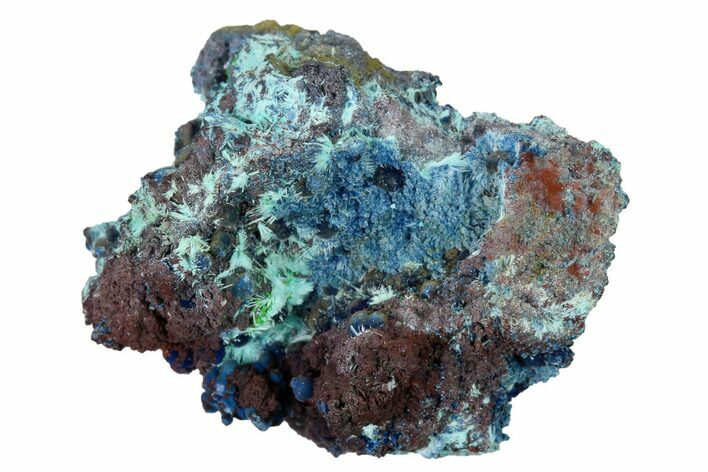This Specimen has been sold.
1.3" Shattuckite, Chrysocolla and Ajoite Association - Mexico
This is a 1.3" wide shattuckite and ajoite specimen from Rancho Jacalito in Sonora, Mexico. It is naturally associated with light blue chrysocolla.
About Shattuckite
Shattuckite is a scarce copper mineral highly regarded for its vivid blue color. It is named after the Shattuck Mine in Bisbee, Arizona, where this mineral was first discovered. It crystallizes in the orthorhombic–dipyramidal crystal system and usually occurs in a granular massive form or as fibrous acicular crystals.
Shattuckite is a scarce copper mineral highly regarded for its vivid blue color. It is named after the Shattuck Mine in Bisbee, Arizona, where this mineral was first discovered. It crystallizes in the orthorhombic–dipyramidal crystal system and usually occurs in a granular massive form or as fibrous acicular crystals.
About Chrysocolla
Chrysocolla is a basic copper silicate that typically forms as a pseudomorph following other copper based minerals. The chemical formula is considered undetermined due to the varying substitutions of elements and water content in its chemical structure. However, there is a form of chrysocolla with an identifiable chemical formula of Cu2H2Si2O5(OH)4 that can be found in microcrystals.
Regularly, chrysocolla will form as botryoidal lumps and spheres, rarely forming visible crystals. It can also form in both solid and fibrous veins, over fibrous minerals, and in crusts. Known for its sharp and vibrant coloring, chrysocolla can display a wide variety of colors such as bluish-green, bright green, light blue, to even sometimes multicolored specimens depending on the atmosphere present during formation.
Chrysocolla is a basic copper silicate that typically forms as a pseudomorph following other copper based minerals. The chemical formula is considered undetermined due to the varying substitutions of elements and water content in its chemical structure. However, there is a form of chrysocolla with an identifiable chemical formula of Cu2H2Si2O5(OH)4 that can be found in microcrystals.
Regularly, chrysocolla will form as botryoidal lumps and spheres, rarely forming visible crystals. It can also form in both solid and fibrous veins, over fibrous minerals, and in crusts. Known for its sharp and vibrant coloring, chrysocolla can display a wide variety of colors such as bluish-green, bright green, light blue, to even sometimes multicolored specimens depending on the atmosphere present during formation.
SPECIES
Shattuckite, Chrysocolla & Ajoite
LOCATION
Rancho Jacalito, Cuitaca, Mun. de Santa Cruz, Sonora, Mexico
SIZE
1.3 x 1"
CATEGORY
ITEM
#155857
 Reviews
Reviews












